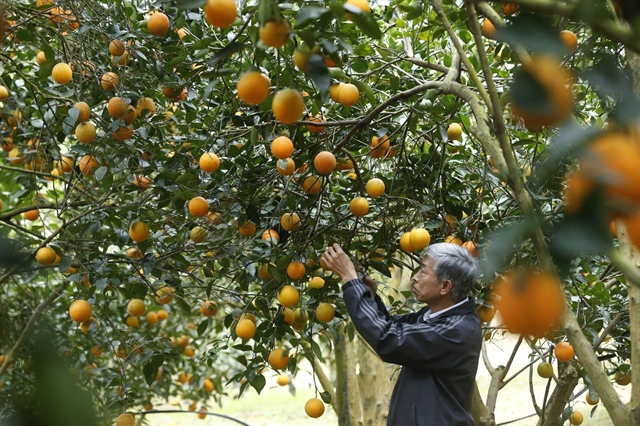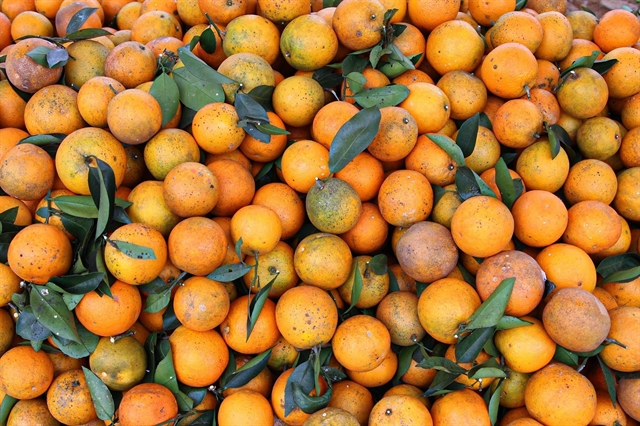 Economy
Economy


|
| A grower harvesting Cao Phong oranges in his garden. VNA/VNS Photo |
HÀ NỘI — Cao Phong oranges, a specialty of the mountainous district of northern Hoà Bình Province, are famous nationwide for their fresh smell, sweet taste and beautiful yellow colour.
In 2014, the oranges received a geographical indication certification, affirming Cao Phong orange’s brand in the local market.
However, it was not until 2019, when Cao Phong district implemented the One Commune, One Product (OCOP) programme, that the oranges truly became a signature brand of the district.
There are five orange products from two units that meet OCOP standards, including three from Hà Phong Cooperative and two from Cao Phong Agricultural Cooperative. The district's OCOP products are good quality, beautiful in appearance and highly competitive.
Vũ Thị Lê Thủy, director of 3T Cao Phong Agricultural Cooperative, said that the OCOP star and the grant of a traceability stamp, packaging and product label were proof of quality, avoiding counterfeit products.
This also contributes to raising awareness and responsibility of businesses and cooperatives in production, ensuring the brand name of OCOP products and the interests of consumers, she added.
The processing of oranges into products, such as orange wine, orange juice and marmalade, has helped elevate the brand, increase incomes and make full use of the oranges.
“Orange products are highly appreciated by consumers for their aroma, thin peel and sweetness. Products made from the district’s oranges retain the sweetness and flavour of fresh oranges,” Thuỷ told VNBusiness.
Bùi Văn Dán, head of the Department of Agriculture and Rural Development of Cao Phong District, said that the One Commune, One Product (OCOP) programme was an economic development programme in rural areas in the direction of developing internal resources and adding sustainable values.
The programme focuses on developing products and services with advantages of each locality. It is actively and effectively implemented by the district, with the two key goals of restructuring the agricultural sector in association with new rural development, and production development for job creation and higher incomes.
"In the coming time, the district will continue to support units to upgrade new products, provide advice on product completion in terms of production process, quality management, labels, packaging and product records to evaluate products at district and provincial levels," Dán said.

|
| A pile of Cao Phong oranges. VNA/VNS Photo |
Maintaining the Cao Phong orange brand
Hoà Bình Province has planted more than 5,300 hectares of oranges in the districts of Cao Phong, Kim Bôi, Yên Thuỷ, Lạc Thuỷ and Tân Lạc.
The expansion of the oranges in many localities is a positive sign, but it is more important to guarantee the quality and maintain the Cao Phong orange brand.
In the past, due to profit-taking and a lack of awareness, a number of orange growers in Hoà Bình bought pesticides of unknown origin, damaging the product's quality and the brand's image.
More than two years ago, Phan Văn Bình bought more than 4 hectares of orange plantation in Bắc Phong Commune, Cao Phong District. At that time the soil and the orange trees were slowly degrading, but with determination in a clean agricultural model, he has invested in a soybean soaking tank to fertilise the plants and an automatic sprinkler irrigation system.
After watering with clean water and being fertilised with fermented soybean, without the use of pesticides, the orange trees have grown well with high quality. Bình said that since the beginning of this year’s crop, one business had ordered the whole garden at double the market value.
“Not many people use this model due to the high costs. As soybean is expensive, people often use potassium to fertilise their garden to grow quickly, but it harm the plants. My garden is fertilised with soybean and processed cow dung,” Bình told VOV.
Nguyễn Hữu Tài, manager of the Department of Agro-Forestry-Fisheries Quality Assurance in Hòa Binh, said that the local government regularly organised technical training programmes on clean agricultural production models for citrus growers.
Units with quality products have signed many contracts for sale in supermarkets, including Vinmart and BigC, as well as wholefood stores.
“In our assessment, the quality of agricultural products in Hoà Bình is guaranteed, and no toxic chemical residues have been founded on the products. We have set up an inspection team to ensure product quality as well as prevent the spread of COVID-19,” Tài said. VNS




